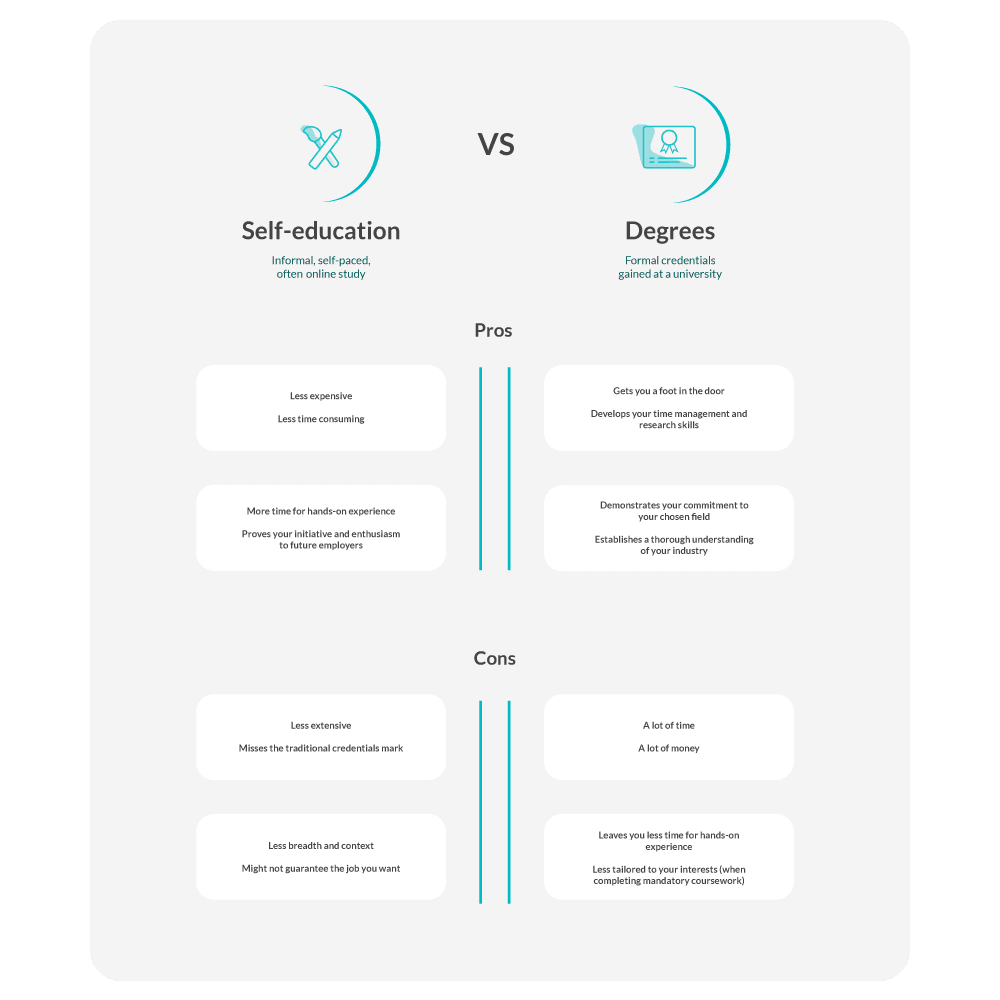Are Degrees Dead? How You Can Sidestep the Status Quo with Self-Education

Are degrees worth it or has self-education rendered higher education expensive, time-consuming, and ultimately useless? We look into the debate to figure it out.
Higher education has never been as oversaturated as it is right now. Over the last 40 years, graduating with a degree has become less of a feat and more of an expectation. In 1982, 645,000 Australians had a degree; since then, that number has jumped beyond comprehension, exceeding 4.8 million people.
The amount of graduates in Australia is constantly growing, and the professional job market hasn’t been able to keep up; since 2008, the number of new professional jobs created in Australia each year has dropped significantly. The supply-to-demand ratio has been thrown off balance, making a lot of young Australians wonder: is getting a degree really worth it?
With self-education and online learning on the rise, people have started to put higher education under the microscope. They’re questioning the time, money and commitment involved in completing a degree —a tradition we’ve taken as gospel for over a century. Luckily, you can challenge the rising education status quo through another means: self-education.
The usefulness debate: an education, or just a piece of paper?

Jordan Ceppi
Consultant, The Hassett Group
So, is getting a degree actually the gateway it’s always been made out to be, or is it a door that leads nowhere? Hassett – a recruitment search firm based in Melbourne – believe that yes, the degree is a means to an end, but only to an extent. “Most, if not all, graduates will land an entry-level role where there are a huge number [of graduates] applying post-university,” says Jordan Ceppi, a consultant for Hassett.
Recruiters and employers are still interested in your education; it’s not the degree they’ve lost interest in, it’s the competition that’s stolen their attention.
With over 200 applicants applying for each entry-level position, you can’t rely solely on your piece of paper anymore. And it shows: in the 80s, only 10% of bachelor-degree graduates had trouble finding full-time employment four months from graduation. By 2017, that had jumped to 28% of new graduates struggling to find full-time employment.
“What prospective job hunters need to look at is a point of difference,” says Jordan. “How many people graduate from university with a degree? A huge amount. How many people graduate from university with a degree and have further education, gained through online courses? This number has drastically decreased – this is your point of difference.”
So, the short answer is yes, getting an education will prove useful in your job hunt, but only if you’re willing to demonstrate your eagerness to learn in other ways. But, if you’re like most young Australians – short on cash and short on time – it seems like a lot to prove for an entry-level job. Where did these high expectations come from?
Credentialism: what is it and how does it influence the job market?
Feeling frustrated that you have to put in all this work for the almost-promise of an entry-level job? Blame credentialism.
Credentialism, a term coined in the 1970s, reduces qualifications to the piece of paper that everyone feels like they have to have, encouraging the pursuit of competencies through institutional means rather than practical means.
When it comes to some professions – like law or medicine – a credential is a minimum entry requirement for a reason, right? The pressures of credentialism start to show when this expectation extends to other professions that don’t necessarily need to be that strict.
For instance, when businesses require an entry-level applicant to have a related degree, even though they’ll get training on the job, you’re probably wondering: what makes my degree a requirement? When a business won’t even consider someone without a degree, even though it’s not strictly necessary, that’s credentialism at work.
Credentialism turns getting a qualification into a “rite of passage” for anyone that wants to succeed in a traditional career. This allows professional businesses and recruiters to control the supply of practitioners, regulate activities, and maintain control over whether their services are perceived as legitimate or not.
Credentialism has been influencing the job market for decades, and its power hasn’t wavered. In recent years, students have been relying on the promise of credentials more than ever. Undergraduate enrolments have increased by the largest absolute number over the past 30 years, with 1.48 million students enrolled domestically and internationally in 2016.
With graduates piling up and the job market lagging behind, it’s become even more of a challenge to get your hands on some decent work experience. Employers have begun to expect even more from their candidates.
The increased competition has encouraged recruiters to want even more. Employers want you to have more than just an education; they’re looking for work experience too. According to Jordan Ceppi, “both academic credentials and work experience are as equally as important as each other.”
“Our clients are specifically looking for candidates who have relative and transferable experience, gained from both hands on work experience and further study (upskilling),” he says. “The ideal candidate in 2021 has gained qualifications through further education and upskilling – these candidates stand out, as it indicates a desire [to] increase his or her credentials.”
Ditching tradition with self-education
A lot of new graduates have felt the pressure to prove themselves and go beyond the extra mile. As a result, there’s been a rise in self-education, and employers have taken a liking to it.
“It is seriously impressive to see some candidates have completed over 2-3 qualifications or short courses alongside their tertiary degree,” says Jordan. “It beefs up their resume.”
If you’re looking for a way to stand out in your post-grad job hunt, self-education is a solution that pays off. Online courses are not only less time-consuming and less expensive than a post-graduate programme or a Master’s degree, they’re also a great way to make up for a lack of work experience (the work experience you didn’t have time for in the middle of exam season).
“We see numerous candidates with gaps in their resumes… to see candidates upskilling within these gaps shows initiative and is highly advantageous to the candidates prospects of landing the job they applied for.”
Educating yourself will help you stand out from the crowd and demonstrate to your future employer that you’re interested in your field beyond the credentials; proving that you want to stay up-to-date and you’re eager to continue learning and growing, through self-reflection and self-education.
Taking an online course or two is also a great option if you haven’t got the degree yet. If you’re just out of the HSC and still deciding whether the HECS debt is actually worth it, online coursework will give you a feel for the industry before you completely commit (the perfect taste test before you commit to the 3-4 years of exam stress).

While credentialism might not have backed down yet, there is hope in self-education. There are more possibilities in online study than ever before, providing more and more solutions to the pressures of credentialism. Before, students needed to pay a lot more to stand out with a Master’s or post-graduate degree. Now, you can go that extra mile without wasting another 2-3 years and emptying your life savings.
Regardless of the path you choose, you’re always going to get something out of your studies. Education is a lot like life; what you put into it is what you get out of it.
Whether you stick to tradition and commit to a degree on its own, add some flair with some extra upskilling, or embrace your potential with self-education on its own, all you really need to do is listen to you.
Challenge the pressures of credentialism and prove your drive on your own.


